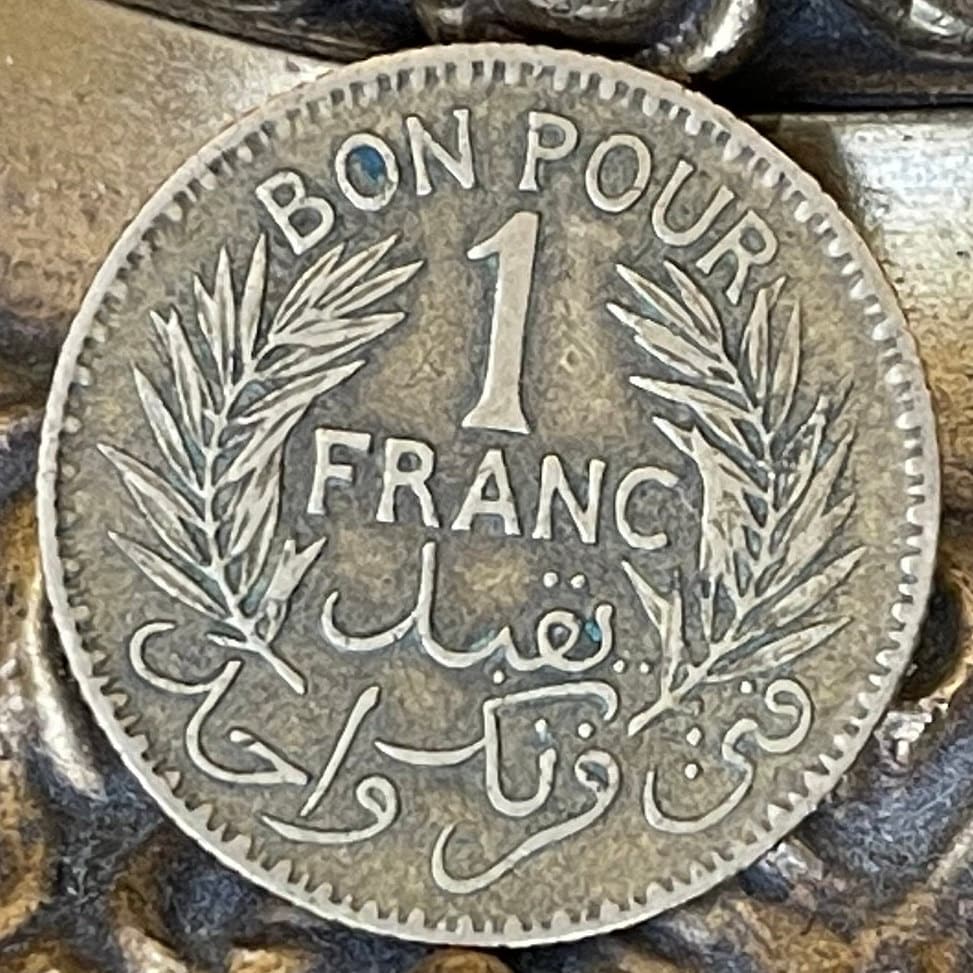elemintalshop
Olive Wreath 1 Franc Tunisia Authentic Coin Money for Jewelry and Craft Making (Tunisian Labour) (Chambers of Commerce Token) CONDITION:FINE
Olive Wreath 1 Franc Tunisia Authentic Coin Money for Jewelry and Craft Making (Tunisian Labour) (Chambers of Commerce Token) CONDITION:FINE
Couldn't load pickup availability
Olive Wreath 1 Franc Tunisia Authentic Coin Money for Jewelry and Craft Making (Tunisian Labour) (Chambers of Commerce Token) (CONDITION: FINE)
N.B. Chambers of Commerce Token Coinage
Obverse: Date, within Olive Wreath
Lettering: TUNISIE
1941
١٣٦٠
العمالة التونسية
Translation: TUNISIA
1941
1360
Tunisian Labour
Reverse lettering: BON POUR 1 FRANC
يقبل
في فرنك واحد
Translation: GOOD FOR 1 FRANC
Features
Issuer Tunisia
Type Standard circulation coin
Years 1340-1364 (1921-1945)
Calendar Islamic (Hijri)
Value 1 Franc (1 TNF)
Currency Franc (1891-1960)
Composition Aluminium-bronze
Weight 4 g
Diameter 23 mm
Thickness 1.59 mm
Shape Round
Technique Milled
Orientation Coin alignment ↑↓
Demonetized Yes
Number N# 821
References KM# 247, Schön# 161
After the First World War the French currency collapsed. In 1921, the franc was devaluated and replaced by pieces from aluminum. These coins were not national issues but substitution coins, tokens minted by the chambers of commerce. The obverse depicts Mercury, the Roman god of trade. ...The inscription on the reverse reads BON POUR 1 FRANC: token for 1 franc.
https://www.moneymuseum.com/en/coins?&id=1188
*******
Wikipedia:
The olive wreath, also known as kotinos (Greek: κότινος), was the prize for the winner at the ancient Olympic Games. It was a branch of the wild olive tree Kallistefanos Elea (also referred to as Elaia Kallistephanos) that grew at Olympia, intertwined to form a circle or a horse-shoe. The branches of the sacred wild-olive tree near the temple of Zeus were cut by a pais amphithales (Ancient Greek: παῖς ἀμφιθαλής, a boy whose parents were both alive) with a pair of golden scissors. Then he took them to the temple of Hera and placed them on a gold-ivory table. From there, the Hellanodikai (the judges of the Olympic Games) would take them, make the wreaths and crown the winners of the Games.
According to Pausanias it was introduced by Heracles as a prize for the running race winner to honor his father Zeus. In the ancient Olympic Games there were no gold, silver, or bronze medals. There was only one winner per event, crowned with an olive wreath made of wild-olive leaves from a sacred tree near the temple of Zeus at Olympia. Olive wreaths were given out during the 2004 Summer Olympics in Athens in honor of the ancient tradition, because the games were being held in Greece which was also used as the official emblem.
Herodotus describes the following story which is relevant to the olive wreath. Xerxes was interrogating some Arcadians after the Battle of Thermopylae. He inquired why there were so few Greek men defending the Thermopylae. The answer was "All other men are participating in the Olympic Games". And when asked "What is the prize for the winner?", "An olive-wreath" came the answer. Then Tiritantaechmes, one of his generals uttered: "Good heavens! Mardonius, what kind of men are these against whom you have brought us to fight? Men who do not compete for possessions, but for virtue."'
Aristophanes in Plutus makes a humorous comment on victorious athletes who are crowned with wreath made of wild olive instead of gold:
Why, Zeus is poor, and I will clearly prove it to you. In the Olympic games, which he founded, and to which he convokes the whole of Greece every four years, why does he only crown the victorious athletes with wild olive? If he were rich he would give them gold.
The victorious athletes were honoured, feted, and praised. Their deeds were heralded and chronicled so that future generations could appreciate their accomplishments. In fact, the names of the Olympic winners formed the chronology basis of the ancient world, as arranged by Timaeus in his work, The Histories.
Amongst the many cultural references concerning the olive wreath, the first line of the first stanza in the Mexican national anthem calls for the motherland, figuratively, to keep hold of the olive wreath surrounding "its temples", a wreath which was given by a holy archangel, for God himself has already written this motherland's destiny.
Share










Coin was exactly as described and customer service is stellar!
Timely shipping and good condition
The item is good quality, and I will recommend.
Very nice coins! So glad to have these in my collection now!!
5 stars review from Victor









